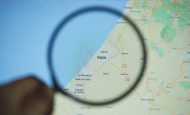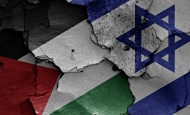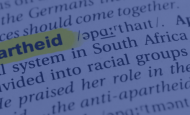Any Excuse to Attack Israel: Amnesty International’s Propaganda on Gaza
Amnesty International is among the most active NGOs that systematically promote demonization of Israel , BDS, and antisemitism – under the facade of universal human rights. In recent years, this bias and discrimination has been reflected in its “apartheid” campaign, extensive efforts to exclude antisemitism as a human rights concern, and undermining the implementation of the International Holocaust Remembrance Association (IHRA) definition to combat hatred of Jews.
In the wake of the barbaric Hamas massacre of 1,500 Israelis and the kidnapping of more than 200, Amnesty has exploited these events to amplify demonization and delegitimization of the Jewish state. As with previous rounds of conflict with Palestinian terror groups, Amnesty has disproportionately focused on allegations of Israeli wrongdoing, as opposed to an intensive campaign regarding the murder, torture, rape, hostage-taking, and dismembering corpses that represent one of the most egregious human rights atrocities in the past 30 years.
“Apartheid” – Amnesty Emphasizes “Root Causes”
In multiple statements, Amnesty emphasizes “the root causes” of the conflict, in particular “Israel’s system of apartheid imposed on all Palestinians.” Amnesty does not identify “root causes” on the part of any other actor, including Palestinians and terror groups. Amnesty’s publications and statements by its officials as part of its ongoing apartheid campaign make it clear that the NGO sees Israel’s existence as a Jewish state as the “root cause” and believes that it should not exist as such. (For details, see NGO Monitor’s reports “False Knowledge as Power: Deconstructing Definitions of Apartheid that Delegitimise the Jewish State,” “Neo-Orientalism: Deconstructing claims of apartheid in the Palestinian-Israeli conflict,” and “Amnesty International’s Cruel Assault on Israel: Systematic Lies, Errors, Omissions & Double Standards in Amnesty’s Apartheid Report.”)
In a statement issued on October 7 (Israel/OPT: Civilians on both sides paying the price of unprecedented escalation in hostilities between Israel and Gaza as death toll mounts), as the Hamas massacre of Israelis was taking place, Amnesty asserts that “The root causes of these repeated cycles of violence must be addressed as a matter of urgency.” It specifies the objective of “ending Israel’s 16-year-long illegal blockade on Gaza, and all other aspects of Israel’s system of apartheid imposed on all Palestinians.”
Similarly, in an October 26 statement demanding an “immediate ceasefire” (Israel/OPT: Urgent call for an immediate ceasefire by all parties to end unprecedented civilian suffering), “Amnesty International also reiterates its calls for…The root causes of the conflict to be addressed, including through dismantling Israel’s system of apartheid against all Palestinians.”
In another instance (Damning evidence of war crimes as Israeli attacks wipe out entire families in Gaza, October 20), Amnesty recommends that the Office of the Prosecutor of the International Criminal Court “Urgently expedite its ongoing investigation in the situation of Palestine, examining alleged crimes by all parties,” adding that this should include “the crime against humanity of apartheid against Palestinians.”
Perhaps the most absurd example appears in a statement ostensibly dealing with violations by Hamas (Israel: Palestinian armed groups must be held accountable for deliberate civilian killings, abductions and indiscriminate attacks, October 12). Amnesty pivots away from Hamas to the “wider context of the situation in Israel and the Occupied Palestinian Territories,” stating, “Civilians will continue to pay a heavy price until Israel dismantles its system of apartheid against Palestinians, including ending its illegal blockade on Gaza.” It also alleges, “Israeli forces have committed in Gaza (as well as in the West Bank and Israel) acts prohibited by the Statute of the International Criminal Court and the Apartheid Convention, as part of a widespread and systemic attack against the civilian population with the aim of maintaining a system of oppression and domination over Palestinians, thereby constituting the crime against humanity of apartheid.”
Gratuitous Demonization – It’s Always about Israel
This last example illustrates Amnesty’s deep-seated animosity towards Israel: the NGO appears unwilling to issue a single statement that focuses solely on Palestinian crimes and does not also target Israel. In the statement about Hamas, Amnesty Secretary General Agnes Callamard refers to “Israel’s well-documented record of war crimes,” “Israeli forces’ retaliatory attacks pummel Gaza,” a “civilian bloodbath in Gaza,” and “collective punishment.” Amnesty also condemns Israel’s “16-year-long illegal blockade on Gaza” and “unlawful attacks.”
A particularly gratuitous and one-sided insinuation, which appears in two statements, relates to “inciting violence and tensions.” Amnesty writes, “The Israeli government must refrain from inciting violence and tensions in the occupied West Bank, including East Jerusalem, especially around religious sites.” There is no parallel call directed toward Palestinian leaders, even though antisemitism and anti-Israel incitement is endemic in Palestinian society.
Another egregious swipe at Israel occurs in “Israel/OPT: Urgent call for an immediate ceasefire by all parties to end unprecedented civilian suffering” (October 26). Seemingly unable to simply demand that “Hamas and all other armed groups [] release unconditionally and immediately all civilian hostages,” Amnesty also immorally equates the kidnapping of innocent civilians, including babies and the elderly, being held incommunicado by Hamas in Gaza, with Palestinians arrested and convicted for terror offenses, including murder, by adding, “Israel [must] release all Palestinians who are arbitrarily detained.”
Finally, in a statement concerning protests in Europe (Europe: Right to protest must be protected during latest escalations in Israel/OPT, October 20), Amnesty opens by claiming that “The devastating consequences of Israel’s bombing and illegal blockade on Gaza are understandably compelling many people in Europe to protest for the rights of Palestinians.” Amnesty refers laconically to authorities’ concerns about “certain chants” and “signs,” without mentioning that many of the anti-Israel demonstrations in Europe (and around the world) have featured blatant antisemitism, incitement, threats, and calls for the destruction of Israel. Amnesty similarly erasing the alarming rise in antisemitic violence globally following the October 7 massacre.
Preoccupation with BDS and Lawfare
For decades, Amnesty has pursued an agenda of targeting Israel, Israelis, and companies that do business in Israel with internationally-imposed sanctions and prosecution. Amnesty exploits the 2023 war in Gaza as another opportunity to advance these anti-Israel tactics.
Amnesty repeats its demand for “a comprehensive arms embargo” against Israel. (Bizarrely, the call for an embargo against “Palestinian armed groups” is not addressed to Iran and like-minded terror-supporters, but rather as: “The international community and particularly Israel’s allies…should also call on states supplying Palestinian armed groups to refrain from doing so.”)
As mentioned above, Amnesty also seeks the intervention of the International Criminal Court (see also here and here and here).
The centrality of Amnesty’s lawfare efforts is highlighted in its response to “reports of a total communications blackout in the occupied Gaza Strip” (Israel/OPT: Civilians in Gaza at unprecedented risk as Israel imposes communication black-out during bombardment and expanding ground attacks, October 27). According to an Amnesty official, the loss of internet and telephone in Gaza is a problem because “human rights organizations have found it increasingly challenging to document violations due to the intensity of Israel’s attacks and restrictions on communications. This communications blackout means that it will be even more difficult to obtain critical information and evidence about human rights violations and war crimes being committed against Palestinian civilians in Gaza.”
Disproportionate Social Media Activity
Amnesty’s social media follows the same discriminatory patterns as their publications. From October 7 to October 30, Amnesty International’s main account tweeted 23 times about the war: 13 tweets exclusively focused on Gazan suffering and allegations of Israeli violations, and 5 tweets called for a ceasefire. Only 2 tweets mentioned Israeli hostages, as part of a broader thread. Similarly, the Amnesty MENA Twitter/X account tweeted 15 times about the war: 10 tweets focused exclusively on Gazan suffering, allegations of Israeli wrongdoing, and pro-Palestinian protests; only one tweet mentioned Israeli hostages, as part of a broader thread, but did not demand their release. Neither account posted a single tweet or thread exclusively focusing on Israeli victims of Hamas’ atrocities or unqualifiedly condemning the massacre.
Agnes Callamard, Secretary General of Amnesty, tweeted 29 times about the war during that time period: 19 tweets focused exclusively on Gazan suffering, allegations of Israeli wrongdoing, and pro-Palestinian protests; 6 tweets called for a ceasefire; only one tweet mentioned Israeli hostages, as part of a broader thread, but did not demand their release.
Amnesty International-UK Campaigns Manager Kristyan Benedict, who has a long history of rank antisemitism, has been prolific on social media, tweeting 170 times about the war since October 7: 157 tweets focused exclusively on Gazan suffering and allegations of Israeli violations; criticism of Israel, the US, the UK, the EU, Germany and France; and pro-Palestinian protests. Seven tweets called for a ceasefire. Only 2 tweets mentioned Israeli hostages, although neither demanded their release. Out of 170 tweets, only a single tweet called Hamas out for committing war crimes.




